Yes, “courageous” is an adjective that is used to describe someone or something that shows courage or bravery. The adjective “courageous” is derived from the Old French “corageus,” which is itself derived from the Latin “cor,” meaning “heart.”
Grammatical Specification of “Courageous”
Pronunciation
The pronunciation of “courageous” is /kəˈreɪdʒəs/ in both British and U.S. English.
Synonyms
Some synonyms of “courageous” include:
– Brave
– Fearless
– Valiant
– Heroic
– Gallant
– Bold
– Adventurous
Etymology
The word “courageous” has its roots in the Middle English language, where it was borrowed from the Old French “corageus.” The Old French word, in turn, was derived from the Latin “cor,” meaning “heart.”
Examples of “Courageous” Used as an Adjective

Here are some examples of how “courageous” can be used as an adjective:
- “She was a courageous woman who wasn’t afraid to support unpopular causes.”
- “I hope people will be courageous enough to speak out against this injustice.”
- “The incredibly courageous men have agreed to participate in a program to reenact the crimes in order to help with their trauma.”
Detailed Grammatical Breakdown of “Courageous”
Part of Speech
As mentioned earlier, “courageous” is an adjective. It is used to modify nouns and pronouns, describing their qualities or characteristics.
Grammatical Function
In a sentence, “courageous” can function as:
– An attributive adjective (e.g., “the courageous soldier”)
– A predicative adjective (e.g., “The soldier was courageous.”)
Inflection
“Courageous” is an adjective that does not have any inflected forms. It remains the same regardless of the number or gender of the noun it modifies.
Comparison
“Courageous” is a positive adjective, and it can be compared using the following forms:
– Positive: courageous
– Comparative: more courageous
– Superlative: most courageous
Usage in Sentences
Here are some additional examples of how “courageous” can be used as an adjective in sentences:
- The courageous firefighters risked their lives to save the trapped residents.
- Her courageous decision to speak out against corruption was admired by many.
- The courageous explorer set out on a perilous journey to uncharted territories.
- The courageous team overcame numerous obstacles to achieve their goal.
- The courageous leader inspired her followers with her unwavering determination.
Conclusion
In summary, “courageous” is an adjective that is used to describe someone or something that exhibits courage or bravery. It has a rich etymological history, tracing back to the Old French and Latin languages. The adjective can be used in various grammatical functions and can be compared to express different degrees of courage. Understanding the grammatical specifications and usage of “courageous” can help writers and speakers use the word effectively in their communication.
References
- https://www.oxfordlearnersdictionaries.com/us/definition/english/courageous
- https://www.oed.com/dictionary/courageous_adj
- https://www.merriam-webster.com/thesaurus/courageous
- https://www.oxfordlearnersdictionaries.com/us/definition/american_english/courageous
- https://www.merriam-webster.com/dictionary/courageous
Hi… I am Sowndharya Jagadeeswaran, a university rank holder in M.A. English Literature. I have also done my master’s in Business Administration. Inquisitive as I am, my interest in action-oriented research helped me publish research papers in reputed journals. Now, as a career, I am an instructor where I teach young and adorable students the intricate technicalities of Public Speaking and Creative Writing. I also enjoy writing articles on topics I specialize and research in.
You can connect with me through LinkedIn.-